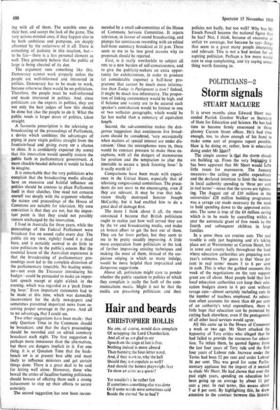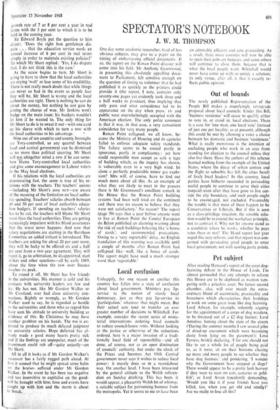Storm signals
POLITICIANS-2 STUART MACLURE
It is seven months since Edward Short suc- ceeded Patrick Gordon Walker as Secretary of State for Education and Science. He has had time to become firmly ensconced in those gloomy Curzon Street offices. He's bad time enough, too, to show enough of his hand to make some sort of progress report possible. How is he doing or, rather, how is education doing under Mr Short?
The simple answer is -that the storm clouds are building up. From the very beginning it has been apparent that Mr Short would fia'Ve little room for manoeuvre. The January measures—the ceiling on public expenditure and the declared intention to limit the increase in local authority spending to `three per cent in real terms'—mean that the screws are tighten- ing. The August cut of £10 million in the universities' £28 million building programme was a savage cut made necessary by the need to hold spending down to the approved estim- ates. The same is true of the £4 million saving which is to be made by cancelling within a year the automatic grant of free meals to the fourth and subsequent children in large families.
In a sense these are routine cuts. The real trouble is only just beginning and it's taking place not at Westminster or Curzon Street, but in town and county halls throughout the land where education authorities are preparing next year's estimates. The guess is that `three per cent in real terms' means 5 to 6 per cent in cash. This is what the garbled accounts this week of the negotiations on the rate support grant are all about. Most people hold that few local education authorities can keep their edu- cation budgets down to 6 per cent without savage cuts—almost certainly including cuts in the number of teachers employed. As educa- tion often accounts for more than 60 per cent of an authority's total expenditure, there is little hope that education can be protected by cutting back elsewhere, even if the protagonists of all other local services would agree.
All this came up in the House of Commons a week or two ago. Mr Short attacked the hypocrisy of Tory critics who alleged that he had failed to provide the resources for educa- tion. To refute them, he quoted figures from the last four years of Tory rule and the first four years of Labour rule. Increase under the Tories had been 52 per cent and under Labour 56 per cent. This was good for some Parlia- mentary applause but the import of it seemed to elude Mr Short. He had shown that over the past eight years, spending on education has been going up on average by about 11 per cent a year, In real terms, this means about 7. or 8 per cent. By highlighting this, he drew attention to the contrast between this historic growth rate of 7 or 8 per cent a year in real terms with the 3 per cent to which it is to be held in the coming year.
Sir Edward Boyle put the question to him direct: 'Does the right hon gentleman dis- pute . . . that the education service needs an annual increase of 6 per cent in real terms simply in order to maintain existing policies?' To which Mr Short replied: 'Yes, I do dispute that. I do not think this is the case.'
As the screw begins to turn, Mr Short is going to have to show that the local authorities are crying 'wolf' or lose some of his credibility.
There is not really much doubt that while things are never so bad in the event as people fear they will be, Mr Short is wrong and the local authorities are right. There is nothing he can do about the money, but nothing he can gain by joining the chorus of woe. Mr Jenkins won't budge on the main issue; his bankers wouldn't let him if he wanted to. The only thing for Mr Short to do is to sweat it out—with one card up his sleeve with which to turn a row with the local authorities to his advantage. '
Nine out of ten counties and county boroughs are Tory-controlled, so any quarrel between local and central government can be dismissed
as no more than political sparring. Mr Short stiill not.altogether mind a row if he can some-
how dame Tory-controlled local authorities and give some encouragement to Labour voters in the May local elections.
If his relations with the local authorities are deteriorating fast, the same is true of his re- lations with the teachers. The teachers' unions —including Mr Short's own Nur—are aware of the meaning of the limitation on local autho- rity spending. Teachers' salaries absorb between 40 and 50 per cent of local authorities educa- tion budgets. If spending on teachers' salaries has to be cut, the teachers will blame Mr Short more than the local authorities. They are getting increasingly impatient with his bland assurances that the worst never happens. And now that salary negotiations are starting in the Burnham Committee an added irritant is introduced. The teachers are asking for about 20 per cent more, they will be lucky to be offered six and a half per cent from a two year agreement. They will reject it, go to arbitration, be disappointed, start strikes and other sanctions—all by early 1969, about the time when the row over finance reaches its peak.
To round it off, Mr Short has few friends in the universities. His manner is cold and his contacts with university leaders are few and icy. He has not, like Mr Gordon Walker or Mr Crosland, ever had close university con- nections. Rightly or wrongly, as Mr Gordon Walker used to say, he is regarded as hostile to the universities and those who so regard him have seen his attitude to university building as evidence of this. By Christmas he may have another problem on his hands. The Pis is ex- pected to produce its much delayed judgment on university salaries. Hope deferred has al- ready made a good many hearts pretty sick and if the findings are unpopular, much of the resentment could rub off—quite unjustly—on Mr Short.
All in all it looks as if Mr Gordon Walker's successor has a fairly rugged path ahead. At first it seemed that he might spread some balm en the bruises suffered under Mr Gordon
Walker. In the event he has been too negative and too insensitive to capitalise on the good-
will he brought with him; time and events have caught up with him and the storm is about to break.







































 Previous page
Previous page